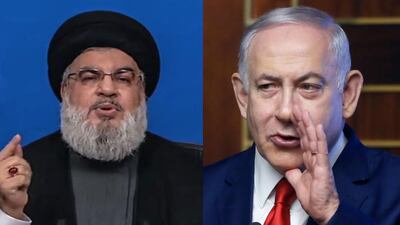Hezbollah chief Hassan Nasrallah and Lebanese leaders need to watch what they say, Israeli Prime Minister Benjamin Netanyahu said on Tuesday, days after two Israeli drones crashed in Beirut and a Palestinian armed group was hit by air strikes near the Syrian border.
Mr Netanyahu said Nasrallah needed to “calm down” after he gave a warning to Israel that his movement was preparing an imminent response to the crash of the two drones.
“I heard what Nasrallah said. I suggest to Nasrallah to calm down. He knows well that Israel knows how to defend itself and to pay back its enemies,” Mr Netanyahu said. Hezbollah and Lebanese leaders should “be careful of what you say and watch your actions”.
Also on Tuesday, Hezbollah said that one of the drones was carrying a five-kilogram explosive device.
“We confirm that the purpose of this first drone was not reconnaissance but the carrying out of a bombing attack,” it said.
Hezbollah said this shows that Sunday’s incident involved not one but two explosives-rigged drones – one which exploded and the other that did not because of a technical failure. Lebanon’s National News Agency also reported that “flare bombs” were launched from Israel, near the Lebanese border, on Monday night.
It said they landed in the occupied Shebaa Farms, an epicentre for conflict between the two countries and near the Golan Heights.
The flares led to a fire west of Shebaa.
"We saw them, we have been in touch with the [Lebanese and Israeli] parties", Unifil spokesman Andrea Tenenti told The National when asked about the flares.
Flares are used to light up areas to improve visibility and are not, he said, “real” bombs.
Mr Tenenti said that apart from the incident overnight, the situation at the southern border had been calm since the weekend and that Unifil continued its usual patrols.
The NNA also reported that an Israeli reconnaissance aircraft was flying low over the eastern city of Baalbek early on Tuesday morning.
Former justice minister and vocal Hezbollah critic Ashraf Rifi addressed President Michel Aoun in a tweet on Tuesday, saying that the state and not the armed group should lead investigations into the drone incident.
“It would have been better to ask the military and security agencies to investigate the Dahieh incident, instead of relinquishing the rights of the state,” he said.
“The government decides on peace and war… only legitimate political and military institutions [should] protect the country.”
Mr Aoun denounced the “Israeli attack” as a declaration of war on Monday night.
Prime Minister Saad Hariri on Tuesday called Russian Foreign Minister Sergey Lavrov to inform him that “the Israeli attack that targeted the southern suburbs of Beirut was a dangerous act and an attack on Lebanese sovereignty”.
Mr Hariri said Lebanon “counts on Russia’s role to avoid sliding towards further escalation and tension, and to send a clear message to Israel that it must stop violating Lebanese sovereignty.
“Israel’s aggression on an area populated by civilians has dealt a blow to the foundation of the stability that prevailed at the border since Resolution 1701.” Israel did not claim responsibility for the attack.
But Mr Netanyahu said on Monday that his country was ready to use “all means necessary” to defend itself against Iranian threats “on several fronts”.
The drones crashed in Beirut a day before Israeli strikes on the Popular Front for the Liberation of Palestine – General Command, a group loyal to the Syrian government, in eastern Lebanon.








